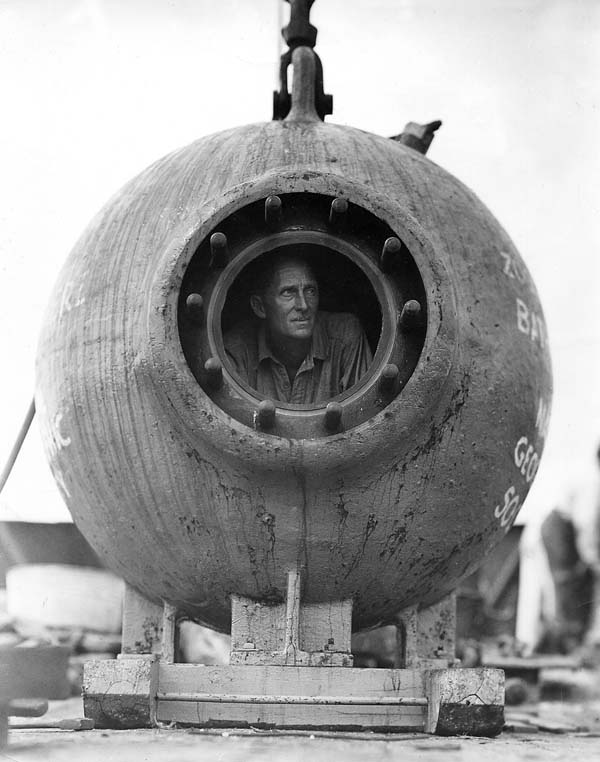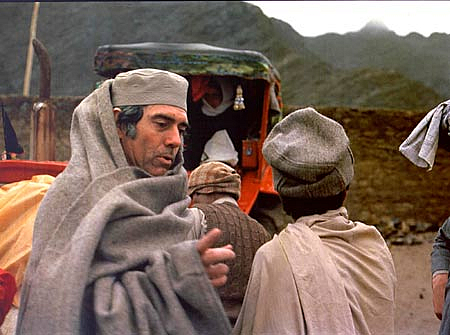
don’t forget the flashlight
In June, 1930, Charles William Beebe and Otis Barton were lowered to the bottom of a trench just off the coast htere in the Bahamas, where they ascended to a depth of 3,028 feet.
They did it inside a crudely cast iron ball, 1.5 inches thick with two tiny portholes made of quartz.
I read all about it yesterday in A Short History of Nearly Everything by Bill Bryson.
The sphere had almost no maneuverability – it simply hung on the end of a long cable – land only the most primitive breathing systems; to neutralize their own carbon dioxide they set out open cans of soda ime, and to absorb moisure they opened a small tub of calcium chloride over which they sometimes waved palm fronds.
But it worked.
There was no instrumentation and the most they could do was peer out of the little window.
In 1948 they dove to 4,500 feet in the Pacific.
Now, maybe you have seen enough National Geographic shows to look at Beebe and Barton’s iron ball and smile.
Don’t.
The only alternative today is Alvin, (built, ironically by General Foods), which can’t dive nearly as deep.
According to Robert Kunzig, quoted in Bryson’s book, “humans may have scrutinized perhaps a millionth or a billionth of the sea’s darkness. Maybe less. Maybe much less.”
Well, that is sobering.
Then there is the way that we conduct international journalism.

Gunga Dan
The picture above, for those two young to remember, is Dan Rather, who was once a vastly overpaid CBS News anchor.
He went to Afghanistan (before the US invaded) and dressed up as an Afghan to ‘report’ on the situation there.
Not speaking a word of Pashtun or Urdu, (and trailed by a large camera crew), how much information do you think he could have c=gleaned to pass on to his American viewers?
Would ‘none’ be a good answer?
Probably?
What could he have learnt that was of any value? What did he know to start with?
Would ‘next to nothing’ be a good start?
Probably generous. (The next to part).
Yet for more than 50 years, this has been the very foundation of American journalism.
A man in a tiny cast iron ball with a small quartz window left dangling in Afghanistan or Iraq for a few hours.
And this we call reporting.
This we call ‘journalism’.
This is what Columbia University President Bollinger feels must be protected.
Why?
What is the value here?
What is the value of this kind of pointless ‘reporting’?
Admittedly, it might have a bit of entertainment value, but not that much. Not for what it costs.
And worse, not for what it does to the American people, because they suffer from what Neil Postman used to call the illusio of knowledge’.
Having seen Gunga Dan on TV ‘reporting’ the news, we now believe we are qualified to have an informed opinion on what is going on there.
We aren’t.
Having illuminated a few square meters of the bottom of the sea in Bermuda, we think we know the oceans.
We don’t.
Now, here’s an interesting difference:
If all the sea life in the world could suddenly tell us what life was like on the bottom of the ocean, our understanding of the bottom o the ocean, and indeed of all sea life would change overnight.
They can’t.
Ironically, hundreds of thousands of people in places like Afghanistan or Iran or Iraq can tell us what life is like there every day.
And they do.
But we don’t accord them any credit.
We don’t want to listen to what they have to say.
We would rather lower another ‘white guy’ in a bathysphere with a video camera to peer out his porthole.
Is it any wonder Iraq and Afghanistan turned into such a mess?
One can only wonder, where is the next disaster?
Michael Rosenblum
For more than 35 years, Michael Rosenblum has been on the cutting edge of the digital video journalism revolution. During this time, he has lead a drive for video literacy, and the complete rethinking of how television is made and controlled. His work has included: The complete transitioning of The BBC's national network (UK) to a VJ-driven model, starting in 2002. The complete conversion of The Voice of America, the United State's Government's broadcasting agency, (and the largest broadcaster in the world), from short wave radio to television broadcasting and webcasting using the VJ paradigm (1998-present). The construction of NYT Television, a New York Times Company, and the largest producer of non-fiction television in the US. Rosenblum was both the founder and President of NYT TV, (all based on this paradigm (1996-1998). The President and Founder of Video News International, a global VJ-driven newsgathering company, with more than 100 journalists around the world. (1993-1996). Other clients include Spectrum News, Verizon and CBS News.
4 Comments
Gary August 22, 2010
Indeed, Dan went to Afghanistan “before” the U.S. invasion—well befire, in 1980, in the midst of the Soviet invasion (who remembers that?). It certainly was a bit of TV showmanship, but like Beebe and Barton, at least he was dangling at the end of the rope, hoping to provide some level of insight into what was previously all darkness. At a time of history, motive may be an important element. But later, motive becomes less important as we study and appreciate the resulting information that was revealed. After all, Beebe was the son of a newspaperman and was an author. Perhaps he was just descending to plug his books. But do we care now? Not likely. His scientific achievements, now considered in the court of history, are really key. Perhaps we should pay Dan Rather the same compliment.
Michael Rosenblum August 23, 2010
I appreciate your point of view, however, I was astonished to learn that even though Beebe and Barton were amateurs and their bathysphere was the most rudimentary, they hold a record that still stands after nearly 80 years. That is not so much a tribute to their achievement as a condemnation of the scientific community (and the US Navy) for investing nothing in deep sea exploration. I have the same condemnation for the journalism profession as a whole. They still cling to the idea of dropping an amateur with a flashlight into most situation – a quick look around – a quick stand up and they’re off and gone. This might have been excusable in an era before the web, but not now.
Malcolm James Thomson August 21, 2010
You are truly in fine form in your holiday hideaway! The most recent posts have been rich in quirky but instructive perspectives. To be perfectly frank, I have found in earlier phases of your postings a hint of eristic redundancy. And, after all, you are preaching to the converted in your advocacy of entrepreneurial journalism and ubiquitous and increasingly confident videography.
A prolonged stay on that island could result in a book, methinks!
Enjoy your vacation.
Michael Rosenblum August 21, 2010
thanks Malcolm. We all need to recharge from time to time!